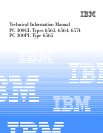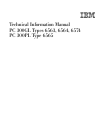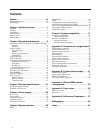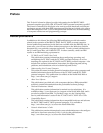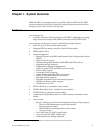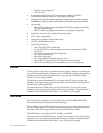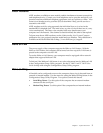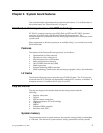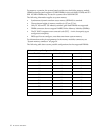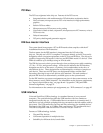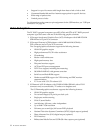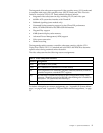
2 PC 300 GL and 300 PL
— Diskette write-protection™
— Alert on LAN
• Accelerated graphics port (AGP) video adapter with up to 16 MB of
Synchronous Graphics Random Access Memory (SGRAM)
• Integrated 16-bit audio controller and built-in high-quality speaker (supports
SoundBlaster, Adlib, and Microsoft® Windows® Sound System applications)
• Networking
— IBM 10/100 megabits-per-second (Mbps) PCI Ethernet adapter with Wake
on LAN in some models
— IBM PCI token-ring adapter with Wake on LAN support (optional)
• Expansion: four drive bays, three PCI expansion slots
• PCI I/O bus compatibility
• EnergyStar compliance (some models only)
• 3.5-inch, 1.44 MB diskette drive
• Input/Output features
— One 25-pin, ECP/EPP parallel port
— Two 9-pin, 16550 universal asynchronous receiver/transmitter (UART)
serial ports
— Two 4-pin, Universal Serial Bus (USB) ports
— One 6-pin, keyboard port
— One 6-pin, mouse port
— One 15-pin, DDC2B-compliant monitor port or
— One 24-pin, DVI-I port on the AGP adapter (on some models)
— Three 3.5-mm audio jacks (in/headphone out, line in, microphone)
CD-RW
CD-Rewritable (CD-RW) drives, standard on some models, enable the recording and
reuse of CD recordable media. The laser used in CD-RW has variable temperatures to
provide the three functions of CD-RW drives: playing CDs or CD-RWs, erasing
CD-RWs, and recording CD-RWs.
CD-RW drives can read traditional CDs, but many older CD players cannot read
CD-RWs. Their light reflective properties are about one-third that of traditional CDs.
CD-RW drives cannot read DVDs.
To learn more about CD-RW drives, see the Understanding Your Personal Computer
publication for your personal computer model and type number. This publication is
available on the World Wide Web at http://www.ibm.com/pc/support.
DVD-ROM
DVD-ROM drives, standard on some models, differ from CD-ROM and CD-RW
drives as the result of refinements in laser technology.
The recording tracks on DVD media are not as deep and are more condensed than on
CDs or CD-RWs, therefore DVDs provide more storage space. DVD media also use
both sides of the disk, as opposed to just one side for CDs and CD-RWs.
DVD-ROM drives read traditional CDs, CD-RWs, and DVDs.
To learn more about DVD-ROM drives, see the Understanding Your Personal Computer
publication for your personal computer model and type number. This publication is
available on the World Wide Web at http://www.ibm.com/pc/support.



